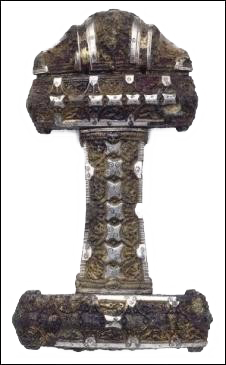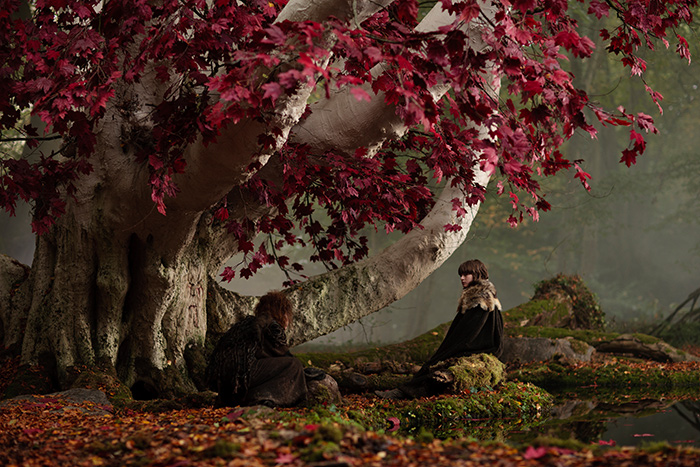As you can see, the reasons are as varied as the opinionated characters that advance such theories. The best-known explanation, however, is that these men fought drugged. According to this theory, the berserkers ingested a fungus called amanita muscaria (a white-stem mushroom with red cap and white spots, which abounds in the birch forests of northern Europe), or some concoction prepared with that mushroom. This has a high toxicity thanks to an alkaloid called muscarine, which completely alters consciousness and perception.
Currently it has been classified as ‘poisonous’, given that in high doses it is deadly. The theory of the amanita muscaria was elaborated in 1784 by the Swedish professor Samual Ödman (who learned about the use of the mushroom by Siberian shamans). It was considered plausible to a certain extent because the Germanic mythology explained that, from the mouth of Sleipnir—Odin’s horse, with eight legs—, it dripped a red foam that, when reaching the ground, became the mushroom. Other drug theories suggest beer with black henbane or bread or beer contaminated with rye ergot.
The theory of drugs is unconvincing, and the two previous facts (Siberian shamans and Odin’s horse) are the only evidence we have to corroborate this thesis. On the other hand, the simple ingestion of a drug does not guarantee by itself an outburst of devastation and warlike frenzy like that experienced by the berserkers. If they actually ingested a drug, it would have been after a long and harsh ascetic and warlike preparation that would have made them resist the possession of the Od, with doses carefully thought for by true connoisseurs of their effects, and with rites designed to enhance and channel certain aspects related to the substance.
Equally unlikely is the theory that the berserkergang was triggered by a kind of ‘hypnotic programmer order’ that was stored in the subconscious through a violent and traumatic ritual initiation, automatically ‘activated’ by listening the noise of the weapons, the battle cries and the chants that invoked Odin’s fury; giving rise to the irresistible longing to be at the centre of the battle, where the fight was fiercer and the wrath more concentrated.
It is most likely that the berserkergang’s attainment techniques were mental or psychological, through hypnotic processes catalysed by powerful rituals, and surely amplified through tribal dances, movements, techniques and breathings capable of generating huge amounts of adrenaline in a short time. And if the drugs were really present, it would have been to facilitate possession, but in no case were they directly responsible for the incredible combative performance that was unleashed with it.
The ornamented hilt of a Viking sword.
Substances released by drugs can be stimulated in the body through purification practices. In the initiatory traditions, when the man gets absolute control over his body, he can stimulate his organs and glands at will, releasing the substances he wants and causing the effects he wants, just knowing how to materialise the thought. Ideally, the drugs that are used come from our own interior, because they are already inside us—such as testosterone, adrenaline, dopamine, pheromones and endorphins. They only need a stimulus to free themselves.
The religious use of drugs appeared at a time when most people were no longer able to go into a trance naturally. And in any case the ingestion of drugs for religious purposes was carried out under strict control and ritualism, and on individuals physically, mentally and spiritually prepared to withstand their effects; everything watched over by the wise about the natural sciences, knowledgeable about plants, animals and the Earth.
During situations of great stress and violence, the body is disturbed. The pulse increases, the breathing accelerates and the adrenaline rises like a flame. A series of physiological responses take place that in themselves are neither good nor bad, but their nature will depend on the use made of them and the output that is given to them. The conventional ‘chivalrous’ warriors tried to dominate the torrent of reactions and sensations that caused the combat so that, keeping their will above them, retained the ‘cold blood’ and consciousness intact.
The berserkers, on the other hand, seemed to do the opposite: they let themselves be carried away by the physical reactions to the fight, so that they took possession of them and ended up into beasts that ‘saw everything red’. Out of them came a totally independent will of consciousness. Only the best were tough enough to really let themselves be carried away by the torrent of ferocity to release their impulses savagely, to lose control, to break all ties in order to allow the beast to ride free, to savour the deep and primitive pleasure of the butchery, bloodletting, slaughter, domination, possession and destruction; submerging all their being in absolute chaos and surviving to be able to tell about it—although it is very probable that afterwards they did not even clearly remember what happened.
Is all this a wild barbarism? Yes, but it is part of human nature, whether you like it or not. Turning our backs on those issues only serves to catch us off guard later. To ignore that we have an animal side is like mutilating the spirit and sabotaging the body. Conversely, to accept this and to master it is to reconcile ourselves with ourselves.


